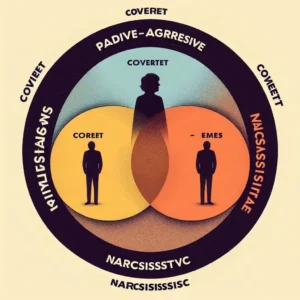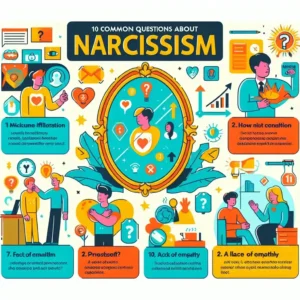Are you dealing with someone who constantly seeks admiration but masks it with humility? Do you know someone who thrives on passive-aggressive behavior and emotional withdrawal to control those around them? These could be signs of a covert narcissist.
In this blog post, we will delve into the 19 traits of a covert narcissist, helping you to identify, understand, and ultimately overcome the challenges they present in your life. Let’s embark on this journey together to discover, learn, and conquer the covert narcissist within your midst.
19 Traits of a Covert Narcissist

Alright, let’s get straight to the heart of the matter and uncover the 19 traits that mark the covert narcissist in your life. Remember, knowledge is your shield and sword in this battle. Let’s go!
- Silent Admiration Seeker: Unlike their more overt counterparts, they crave praise but in a more undercover manner.
- Master of Humility: They’re all about appearing modest, but it’s really just a ruse for attention.
- Passive-Aggressive Pro: Their criticism comes wrapped in a backhanded compliment, leaving you uncertain and off-balance.
- Jealous Yet Quiet: They won’t openly admit it, but they’re green with envy at others’ success.
- Fake Listener: Seems like they’re all ears, but they’re really just waiting for their turn to talk.
- Victimhood Champion: Always the martyr, they have a story for why everything is someone else’s fault.
- Grudge Holder: They keep a mental list of every slight, real or imagined, forever.
- Emotional Withdrawer: Pulling back when things don’t go their way, using silence as a weapon.
- Sneaky Critic: Their “advice” is often just a way to make you feel small.
- Perfection Obsessed: Nothing and no one is ever good enough for them.
- Sympathy Fisher: They’re great at making you feel sorry for them, all to get what they want.
- Abandonment Fearful: Deep down, they’re scared of being left, which drives much of their manipulation.
- Fault Denier: Admitting they’re wrong? Never. It’s always someone else’s mistake.
- Superiority Dreamer: In their mind, they’re better than everyone else.
- Quiet Saboteur: They’ll subtly undermine your efforts, without you even noticing.
- Sensitive Critic: Can dish it out but can’t take it. Their “sensitivity” is selective.
- Anti-Social Media Manipulator: Their online life is a carefully curated image aimed at garnering likes and envy.
- Solitude Strategist: Their withdrawal aims to pull you in closer, making their absence felt.
- Empathy Faker: They seem understanding, but it’s just another manipulation tool. Each trait is a piece of the puzzle, helping you see the full picture of the covert narcissist’s playbook.
The Mask of Humility
Dive deep into the facade of humility worn by covert narcissists, where modesty is but a clever disguise for a voracious hunger for recognition. This deceptive humility is their battlefield, expertly crafted to ensnare admiration while feigning disinterest.
Don’t be misled by their apparent modesty; it’s a meticulously curated act designed to draw you in. Their humility isn’t a sign of genuine self-awareness but a strategic ploy to fulfill their relentless pursuit of validation.
As we peel back this mask, we empower ourselves to see beyond the illusion and understand the true motivations that drive their actions. Recognizing this trait is your first step in navigating the complex dance of interactions with a covert narcissist.
The Silent Demand for Admiration
Covert narcissists operate in the shadows of subtlety, craving the spotlight without the overt declaration of their needs. They master the art of indirect solicitation – fishing for compliments, orchestrating situations where their worth can be acknowledged without an explicit request.
It’s a silent performance, an unvoiced plea for affirmation that lurks beneath their interactions. They may not shout for attention, yet their silent screams for recognition echo loudly for those attuned to these signals.
Their craving for validation, disguised as humility or self-deprecation, is a call to action for us to see through their veiled requests and understand the profound depths of their need for admiration.
The Art of Passive Aggression
Unmask the covert tactics of the passive-aggressive covert narcissist! They wield sarcasm and indirect jabs like a sword, expertly concealing their attempts to dominate and control. These maneuvers are subtle, yet their impact can shake the very foundation of our interactions.
Beware the backhanded compliment and the veiled insult, for they are the weapons of choice for those skilled in the art of passive aggression. By identifying these tactics, we empower ourselves to confront and navigate these treacherous waters, ensuring our relationships and self-esteem remain intact.
Stand firm, for in understanding the nuances of passive aggression, we unlock the power to neutralize its effect and reclaim our sense of agency.
Envying the Spotlight, Shadowed in Silence
In the quiet shadows of their apparent humility, covert narcissists hide a burning envy for those basking in the glow of attention and accolades. This jealousy isn’t overt; it’s a silent torment, eating away at their sense of self, propelling them into a cycle of resentment and inadequacy when faced with others’ successes.
It’s a hidden battle, where they feel perpetually overshadowed, pushing them to undermine those they view as rivals. Recognize this trait, and you begin to dismantle the power it holds over them—and potentially over you.
Understanding this envy is crucial in comprehending the complex web of emotions that drive a covert narcissist’s interactions with the world.
The Listener Who Never Hears
Within the conversational dance, the covert narcissist performs a deceptive ballet, appearing engaged while their mind orbits solely around their universe. This trait isn’t merely an oversight; it’s a calculated dismissal of the value and experiences of others.
They might nod in agreement or mirror your expressions, yet their hearts are miles away, fixated on the next moment they can redirect the spotlight onto themselves.
This apparent attentiveness is a mirage, designed to maintain the facade of connection without the substance. Recognizing this disconnect allows us to break free from the illusion, steering our efforts towards genuine interactions where our voices are not just heard but valued.
The Victimhood Veil
Unveil the masquerade of victimhood that covert narcissists masterfully employ! This manipulative tactic is not just a cry for attention; it’s a strategic move to shift blame, avoid responsibility, and draw you into their emotional whirlpool.
By portraying themselves as perpetual victims of circumstance or the actions of others, they cunningly seek to evoke your sympathy and manipulate your perception.
Recognize this act for what it truly is—a powerful tool in their arsenal to maintain control and elicit support without facing the consequences of their actions. Stand strong and see through this veil, as it’s a crucial step in dismantling the manipulative dynamics at play and moving towards healthier interactions.
The Secret Keeper of Grudges
Beware the covert narcissist’s shadowy realm of hidden resentments! Like a minefield buried beneath the surface, their grudges lurk, waiting to explode at the slightest provocation. These secret keepers clutch onto past slights with a vice-like grip, turning minor grievances into lasting vendettas.
This silent hoarding of animosity isn’t just a quirk—it’s a strategy, aimed at keeping you off-balance and under their invisible control. Recognize this pattern, and you arm yourself with the insight to sidestep their hidden traps.
Navigate this treacherous terrain with confidence, understanding that the power to disarm these concealed grudges lies within your grasp.
The Emotional Withdrawal as Control
Prepare to confront the covert narcissist’s silent weapon: emotional withdrawal. This tactic is not about needing space; it’s a calculated move to manipulate and destabilize, leaving you in a whirlwind of confusion and self-doubt.
When they retreat into silence or distance themselves emotionally, it’s an attempt to punish and control, making you dance to their tune. Recognize this game for what it is—a power play.
Your awareness is the key to breaking free from this cycle, allowing you to maintain your equilibrium and stand your ground against their subtle tyranny.
The Critique Behind Closed Doors
Step into the covert world where criticism doesn’t shout; it whispers, cunningly dressed as advice. Covert narcissists thrive in this realm, offering critiques that seem gentle yet cut deep, aiming to erode confidence under the guise of helping.
This strategy is not about upliftment; it’s a calculated move to keep you questioning your worth while they maintain the upper hand. Recognize this subtle undermining for what it is: a play for power. By seeing through this tactic, you reclaim your confidence, refusing to let your self-esteem be the casualty of their hidden agenda.
The Overwhelming Need for Perfection
Embrace the challenge of dealing with a covert narcissist’s pursuit of perfection! It’s a high-stakes game where their expectations soar beyond the realms of reality, setting the scene for inevitable disappointment and self-doubt among those in their orbit.
This relentless quest for flawlessness isn’t just about achieving unparalleled excellence; it’s a veiled attempt to assert dominance and provoke feelings of inadequacy.
By recognizing this trait, we arm ourselves with the strength to push back against unrealistic standards, fostering an environment where genuine effort and progress are celebrated over unattainable ideals. Let’s navigate this journey together, transforming pressure into empowerment and constraint into freedom.
The Expert at Eliciting Sympathy
Master the awareness of how covert narcissists craft their narratives to become maestros of manipulation, playing on your heartstrings with tales of sorrow and struggle.
Their skillful orchestration of vulnerability is not a bid for genuine connection but a calculated strategy to draw you into their sphere, fostering an atmosphere where you’re moved to offer support, compassion, and, ultimately, compliance.
This adeptness at eliciting sympathy is a testament to their cunning, manipulating emotions to secure their desired outcome—your unwavering loyalty and service to their needs. Recognize this manipulation for what it is: a ploy to ensnare your empathy for their gain.
The Fear of Abandonment
Dive into the heart of a covert narcissist’s hidden vulnerability: their profound fear of abandonment. This isn’t just a minor concern; it’s a driving force that fuels their manipulative behaviors, pushing them to lengths unimaginable to secure their emotional fortress.
They mask this fear with a veneer of self-sufficiency, yet underneath lies a desperate quest for validation and assurance. Recognizing this fear not only sheds light on their complex psyche but also offers a pathway to understanding the roots of their controlling tactics.
It’s a critical insight that arms you with the knowledge to navigate the intricate dynamics of your relationship with a covert narcissist, transforming obstacles into stepping stones towards resilience and empowerment.
The Reluctance to Acknowledge Faults
Navigate the treacherous waters of dealing with someone who never admits they’re wrong. This aversion to acknowledging faults is a hallmark of the covert narcissist, creating barriers to genuine communication and growth. Their world is one where blame is a hot potato, always to be tossed onto others.
By recognizing this trait, we’re equipped to engage more effectively, sidestepping the frustration that comes from their denial and deflection.
It’s about seeing the situation for what it is—a defensive mechanism rooted in their need for perfection and superiority. Our response? To stand firm in our understanding and compassion, turning challenges into opportunities for our empowerment.
The Fantasy of Superiority
Plunge into the covert narcissist’s world, where an illusion of superiority reigns supreme. They dwell in a fantasy land, perched on a pedestal of their own making, silently proclaiming their alleged distinctiveness and entitlement.
This hidden grandiosity fuels a dissonance between how they view themselves and the stark reality, driving their insatiable thirst for external adoration.
By recognizing this disparity, we challenge the very foundation of their self-constructed narrative, empowering ourselves to break free from the chains of their illusionary superiority. Engage with this knowledge, and you ignite the first spark in dismantling their façade, paving the way for genuine growth and liberation.
The Quiet Saboteur
Dive into the stealth mode of the covert narcissist, a master at the subtle art of sabotage. Their tactics, though quiet, pack a powerful punch, meticulously designed to undermine and destabilize without a trace. This insidious behavior might not scream for attention, yet its impact is profound, chipping away at the foundation of trust and confidence.
By bringing these acts into the light, we arm ourselves with the knowledge to recognize and counteract their maneuvers. Engage in this understanding, and you become adept at neutralizing their silent schemes, fortifying your defenses against the covert attacks that seek to derail your progress.
The Sensitive Critic
Embrace the challenge when facing the covert narcissist’s double-edged sword of sensitivity. They cloak their criticism with a veil of care, only to unveil a judgmental edge that can slice through confidence. This paradoxical interplay between their claimed empathy and their critical nature tests our resilience.
Recognize their feedback not as personal failing but as a reflection of their complex insecurities. Our power lies in discerning the true intent behind their words, transforming potential wounds into badges of strength and self-awareness.
The Anti-Social Media User
Dive into the digital arena with the covert narcissist, a strategic player in the quest for online adulation. Their social media presence is a carefully constructed masterpiece, designed to harvest admiration and applause with each post and update.
This digital dance for approval isn’t just about building connections; it’s a meticulously played game to fuel their ego, leveraging likes and comments as the currency of their self-esteem.
Recognize this virtual facade as another layer of their complex quest for validation, and you’re one step closer to understanding the full spectrum of their narcissistic domain.
The Solitude Seeker for Attention
Dive headfirst into the enigma of the covert narcissist’s solitude! This strategic retreat isn’t about genuine desire for peace but a calculated move to stir curiosity and beckon the spotlight.
Their self-imposed isolation is a chess play, ensuring they remain the focal point, even in absence. It’s a cunning paradox, where their avoidance serves as an invisible beacon, drawing attention and concern, keeping them squarely at the center of thoughts and conversations. Recognizing this maneuver unveils their game, equipping us with the insight to challenge and redirect our engagement.
The Paradox of Empathy
Unravel the complexity of the covert narcissist’s empathy! This paradoxical trait showcases their ability to mimic compassion and understanding, a skill used not to connect but to manipulate. Their feigned empathy serves as a cloak, hiding their true intentions under the guise of sensitivity.
By recognizing this duality, we unlock the potential to differentiate between genuine empathy and calculated manipulation. This insight is a powerful tool, guiding us to navigate their emotional labyrinth with clarity and resolve.
Embrace this knowledge, and you fortify your defenses against the covert narcissist’s most deceptive tactic, transforming their paradox into your path to empowerment.
FAQs
**What’s a covert narcissist?**
A sneakier version of the typical narcissist you might picture. They crave admiration and control but in a more under-the-radar way.
**How can I spot a covert narcissist?**
Look for subtle signs like a false sense of humility, silent demands for admiration, passive-aggressive jabs, and a tendency to play the victim or withdraw emotionally to manipulate.
**Can a covert narcissist change?**
Tough question! With awareness and a genuine desire to change, plus professional help, it’s possible. But, it’s a long road that requires a lot of effort and commitment.
**How do I deal with a covert narcissist?**
Set firm boundaries, maintain a healthy distance when possible, and focus on your well-being first and foremost. It’s about protecting your energy and not getting caught in their web of manipulation.

James Green is a seasoned psychologist specializing in narcissism and other personality and relationship issues. With a passion for helping others understand and navigate their own personality traits and relationships, James shares his insights and expertise on his blog, Personality Diaries. Connect with him on Pinterest and Instagram for regular updates and insights.



















































